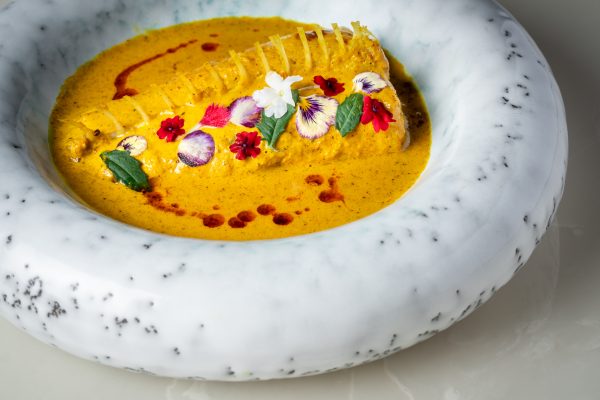A superstition boom full of faith in Thailand
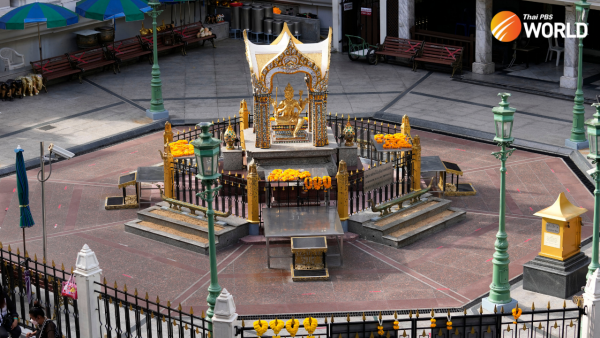
In this ever-changing world, many people are overwhelmed by uncertainties and fears. Competition at work, rampant layoffs, finances, parenting, friendships and pandemic concerns can all spark tension, leaving people feeling stressed, anxious and emotionally drained.
To cope with these feelings, a large number of Thai people have turned to superstitious objects, lucky charms, amulets, talismans and even occult rites, known as mutelu, in the hope that they will bring fortune, prosperity and good luck, a study has found.
The findings of a survey on mutelu behavior released in 2024 by the Hakuhodo Institute of Life and Living ASEAN (Thailand) revealed that 88% of respondents believed in superstition and had faith in mutelu, with ‘money’ and ‘good luck’ at the top of the most requested blessings.
Mutelu, for many Thai people, refers to people who travel to holy sites or places to worship sacred objects.
Many worshippers pray for blessings from amulets and talismans to bring peace, fulfil their hopes and wishes. When they receive what they asked for, they will return to developer the promised offerings.
According to the study, more than half of respondents (52%) reported that they see mutelu as a spiritual anchor. And over 65% of them said they pray for blessings for themselves.
The study involved over 1,200 Thai people of different age groups. Each group had particular worship and mutelu behavior, the study found.
Gen X respondents (43-58 years old) prefer visiting temples, making merit, praying to boost morale and hope, as well as for good health.
Gen Y respondents (27-42 years old), meanwhile request money, good luck and career advancement when practising mutelu.
Gen Z respondents (11-26 years old) enjoy worship activities that fit their lifestyle and own amulets and lucky charms that are chic and trendy.
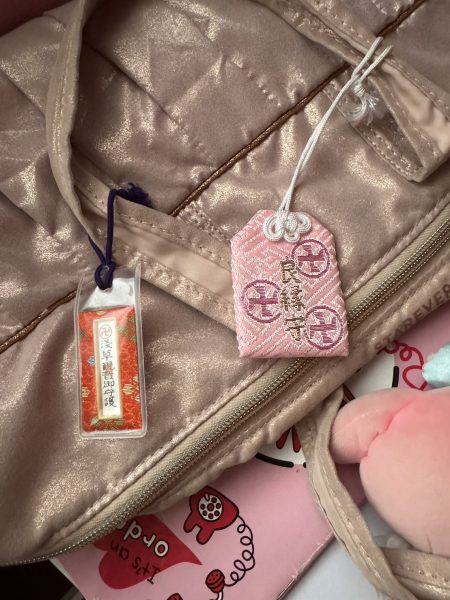
A phenomenon sweeping Thailand post Covid-19
The mutelu trend has been all the rage since 2020 when the impacts of Covid-19 caused uncertainty and fear of the unknown, affecting well-being and mental health. Many people started looking for a holy place where they might be blessed and receive good luck.
The trend has grown significantly, mainly driven by famous masters of rites, actors, actresses, celebrities and influencers who believe in mutelu and travel to sacred sites to worship.
They have posted pictures and videos of their journeys, mutelu activities and talismans on social media, given interviews on TV shows and shared experiences and stories of their successful blessings.
This has inspired many to travel to the same sites and imitate the practices in the hope of having the same luck and fortune.
Boromvudh (Mick) Hiranyathiti and Pornchita (Benz) na Songkhla, a Thai celebrity couple, who have faith in Naga or phaya nak, for instance, shared their personal experiences with superstitions and a story of winning the lottery 10 consecutive times following the worship of a serpent.
Speaking on a TV show, they credited the serpent for the lottery wins. Mick has also created the ‘Mukabmick’ Facebook page where he posts and shares his mutelu activities and offers suggestions on leading sacred sites to worship amulets and talismans.
Thai travel agencies have capitalized on this popular lifestyle trend and created faith-based travel programs to draw local travellers who believe in superstitions and spiritual beings and wish to do mutelu activities.
Some of the leading mutelu sites included in the travel program are Wat Chedi Ai Khai (temple of the boy ghost) in Nakhon Si Thammarat where it is believed that the boy ghost can fulfill hopes and grant wishes, especially winning lottery numbers; Naka Cave (the famous giant snake rock) in Bueng Kan, which people visit for good fortune and lottery numbers; and Thao Wessuwana, a prominent demon-god in Thailand’s religious pantheon and the guardian of wealth and finance at Wat Chulamanee in Samut Songkhram.
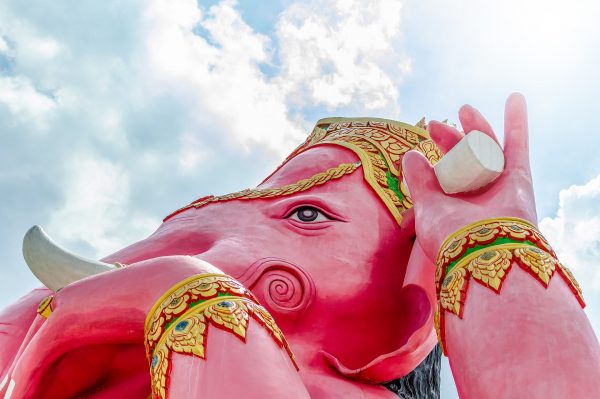
The power of belief and worship
With the trend continuing to grow, Thai PBS World conducted a random survey to find out who believes in superstitions and spiritual beings, and if they worship any amulets, talismans and do mutelu activities in a holy place to try to boost their luck. We also asked them who inspired or what motivated them to engage in these activities.
Chompoo A. and her husband, both Buddhists, have a strong faith in Luang Phor Sothorn, a Buddha image that is enshrined in Wat Sothonwararam Worawihan in Chachoengsao. They visit the temple to worship the Buddha image every other month to pray for stability and fulfilment.
Chompoo said the couple had long struggled with infertility so her husband decided to do mutelu and ask the Luang Phor for fertility.
“My husband has always wanted to have a baby. We called for Luang Phor’s blessing to grant us a healthy child. Many Buddhists, ourselves included, believe that Luang Phor has the power to grant wishes. With him, nothing is impossible. And he answered our prayer!” said Chompoo, a 49-year-old mother with a 2-year-old daughter.
“We presented 300 boiled eggs as offerings,” she added.
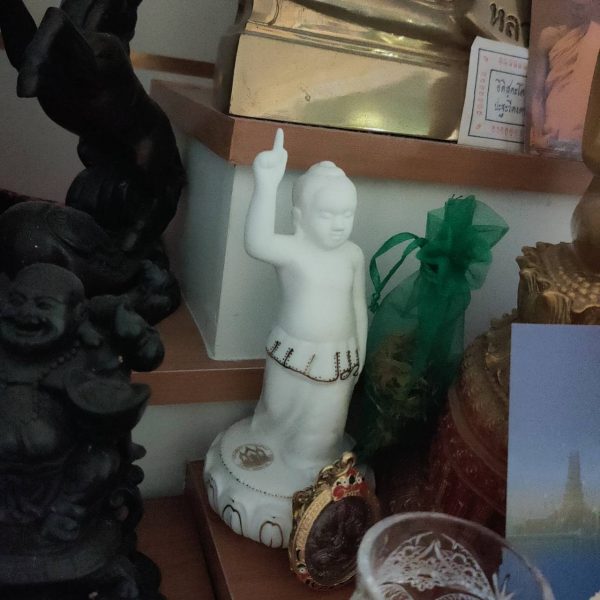
Chompoo said she also believed in Ai Khai and has the boy ghost statue at home. She plans to travel to Nakhon Si Thammarat to worship Wat Chedi and Ai Khai soon.
“Someone gave the statue to my mother. I have learned about his power to grant wishes. If I could visit the temple to worship, it would be a wonderful experience for me,” she said.
Ai Khai is the identity of Wat Chedi which is widely recognized as one of Thailand’s most famous holy sites for people who believe in superstitions and spiritual beings that have the power to fulfil hopes, grant wishes and bring fortune and luck, especially winning lottery numbers.
The big pile of stucco roosters, fragments of firecrackers, children’s toys, and red soda that worshippers present to the boy ghost as offerings scattered around the temple’s grounds bear witness to the strong faith worshippers have in him.
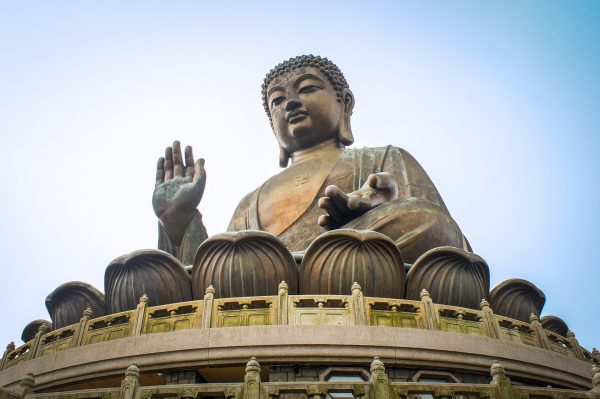
Kittiya C., 35, a freelance graphic designer, has started to say morning prayers since her father became ill to seek blessings from spiritual beings that will help him regain his strength, protect her family and prevent bad things from happening.
“I ask for spiritual guidance to direct me in everything I do, keep me and my family safe and empower us. I sometimes visit a sacred place to worship amulets and ask them to help me run my project smoothly,” she says.
She also wears clothes according to the auspicious shirt color guide, an ancient astrological belief that particular colors worn on specific days are believed to boost power, bring money and good luck, keep the wearer healthy and unlock love life.
“It helps boost my luck at work,” Kittiya said.
Panita H., a 26-year-old employee said she and her friends visited Sensoji Temple where the statue of Kannon Bodhisattva, the Goddess of Mercy is enshrined, and the Asakusa Shrine in Tokyo last year.
“I love Tokyo and the weather. My friend and my sister who believe firmly in the temple and the shrine, invited me to this spiritual site,” she said.
She also purchased the good luck charms sold by the temple and the shrine which are believed to be blessed with the power of the gods to bring luck to people who have them.
“I’ve got three charms now. I bought the pink and the white ones myself. My sister bought me the red one. The pink is believed to bring good love. The red is for health. I hung the white one on the wheel. It’s for safety while travelling,” she said.
Panita said she often goes to temples and holy places in Thailand and prays, mostly for work, success and good luck.
“Whether I get what I have asked for or not, visiting a sacred site in which I have faith and praying helps heal my mind when I’m feeling down,” she said.
By Thai PBS World Feature Desk






